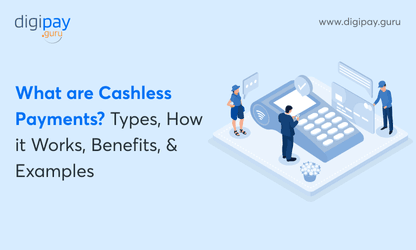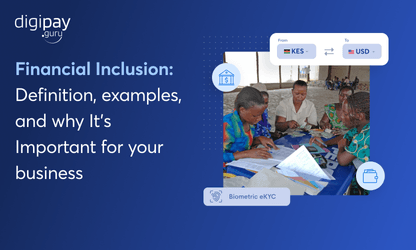The global digital payment market was valued at $8.97 trillion in 2023!
This shows that digital payments have come a long way. From swiping cards to scanning QR codes, the way money moves is evolving rapidly. But with greater innovation comes greater responsibility.
If you're a financial institution, fintech, or payment service provider, you can't afford to treat compliance as an afterthought. Payments compliance is no longer just a checkbox exercise—it's a foundational pillar of your business. Security and compliance are the reasons why customers trust you.
In this blog, you'll discover:
-
What does payment compliance mean
-
Why it matters more than ever
-
The key payment regulations you must follow
-
Major challenges of staying compliant with payment regulations, and
-
How the right digital partner can help you stay compliant while scaling confidently
Let’s begin by understanding the meaning of payment compliance.
What Is Payment Compliance? And Why It Matters
Payment compliance means ensuring that your payment systems and operations follow local and global payment rules and regulations. These rules are put in place to protect consumers, secure financial data, and prevent fraud and money laundering.
It’s the framework that lets your payment services run legally and securely. You don’t just process a transaction; you make sure every transaction meets standards set by regulators, industry bodies, and data protection laws.
When you comply with payment processing regulations, you protect sensitive information, build trust, and reduce the risk of fines, lawsuits, and data breaches.
Failing to meet compliance requirements can lead to:
-
Massive penalties from regulators
-
Reputational damage
-
Loss of partnerships or licenses
-
Increased fraud exposure
This means with payment compliance, you’re not just reducing risk; you’re earning credibility.

Who Regulates and Governs Payment Compliance?
Multiple regulatory bodies across different regions govern the payment processing compliance space. Here are some of the key players:

PCI Security Standards Council (PCI SSC)
The PCI Security Standards Council (PCI SSC) manages PCI DSS compliance, which is part of card industry data security. They set global standards for all payment processors, card issuers, and digital wallet providers. They must follow these standards to encrypt and protect data from breaches.
European Union Regulators
European Union regulators like the European Commission enforce regulations like GDPR and PSD2. GDPR is for user data privacy and accountability, and PSD2 is for secure online payments and third-party service providers. This creates a safer and more innovative payments ecosystem.
Central Banks and Local Regulators
Central banks and national regulatory bodies set the payment services regulations in their jurisdictions. They define the licensing, operational, and security requirements for banks and fintechs. This ensures transparency, protects consumers, and adheres to compliance across all payment systems.
FATF (Financial Action Task Force)
The Financial Action Task Force (FATF) sets global AML standards to detect and prevent suspicious activities. Its compliance requirements help payment service providers and financial institutions:
-
Reduce the risk of money laundering, and
-
Adhere to global anti-money laundering frameworks
If you provide international remittance, multicurrency wallets, or worldwide payment processing services, compliance becomes much more difficult. To be globally compliant, these services must manage a variety of local laws, tax rules, and consumer protection regulations.
Key Compliance Regulations in Payment Processing
Let’s break down the most relevant payment compliance standards you should care about.

PCI DSS: Protecting Cardholder Data
PCI DSS (Payment Card Industry Data Security Standard) is one of the most important PCI compliance requirements. It sets the rules for storing, processing, and transmitting cardholder data securely.
If you’re dealing with card transactions, PCI compliance is required. This includes digital wallets, payment processing companies, and eCommerce platforms.
You can ensure PCI card compliance by:
-
Using tokenization and encryption
-
Restricting data access
-
Running regular vulnerability scans, and
-
Securing card data in all payment modules (wallets, merchant acquiring, prepaid cards)
With PCI compliance security, you're not only avoiding fines but also protecting your reputation and customer trust.
Explore our official PCI DSS listing to see how we help businesses stay secure and compliant
GDPR: Customer Data Protection
The General Data Protection Regulation (GDPR) applies to any business that handles personal data from EU citizens. It regulates how financial institutions acquire, store, and use user data.
Its principles include:
-
Transparency
-
Accountability
-
Informed consent, and
-
Right to access and erase
Whether you're managing KYC data, transaction history, or biometrics for face verification, GDPR demands control and purpose-limited usage.
This directly affects your eKYC, remittance, and digital wallet modules. Non-compliance can mean penalties as high as 4% of global annual revenue. Yes, you read that right.
PSD2: Security Meets Innovation
PSD2 (Revised Payment Services Directive) fundamentally alters how payment systems operate in the EU. It requires strong customer authentication (SCA) and opens the way for open banking via secure APIs.
It defines roles like:
AISPs (Account Information Service Providers): AISPs access and aggregate customer financial data from different banks to provide users with a consolidated view of their accounts.
PISPs (Payment Initiation Service Providers): PISPs initiate payments directly from a user's bank account with their consent, offering secure alternatives to traditional card-based payments.
ASPSPs (Account Servicing Payment Service Providers) :ASPSPs hold user accounts and provide APIs to enable third-party providers to access account information or initiate payments securely.
If you're integrating with third-party fintechs or banks, PSD2 ensures that those connections are safe, user-consented, and traceable.
In short, it pushes you to innovate while staying secure.
Major Challenges in Staying Compliant With Payments Regulations
Meeting payment compliance obligations is easier said than done. Many businesses struggle with the following challenges in staying compliant with payment regulations:
Constantly Changing Regulations
Payment rules and regulations change daily across different geos. What’s compliant today will get you penalties tomorrow. And staying up to date requires dedicated resources and continuous system updates.
Tech Limitations
Old infrastructure can’t handle modern compliance. Plus, outdated payment processing systems have blind spots in fraud monitoring, encryption, and regulatory updates. This puts you at risk.
Payment Fraud Risk
Even if you are compliant, fraud can still occur. Because sophisticated frauds have been identified. This involves phishing, chargeback abuse, and synthetic identity fraud. These scams can easily get past weak layers of security and affect customer trust.
Operational Burden
Compliance involves constant audits, documentation, and reporting.
In addition to that, manual workflows:
-
Slow down innovation
-
Delay the go-to-market speed, and
-
Eat up the bandwidth your teams could use to scale smartly
Some common fraud types you’re trying to fight:
-
Identity theft
-
Phishing attacks
-
And Chargeback fraud
Without robust and secure digital payment systems, fraud slips through the cracks.
How DigiPay.Guru Helps Overcome Compliance Hurdles
DigiPay.Guru strives to offer full compliance and advanced security at all times. So you don’t have to worry about maintaining all the complex standards and regulations.
Moreover, all the digital payment solutions by DigiPay.Guru ensures that your payment services are secure, monitored, and aligned with key compliance standards.
- Multi-layered Application Security
From network firewalls to anti-DDoS protection, the system architecture is fortified against internal threats and external attacks. This ensures that the data remains uncompromised.
- Real-Time Fraud Monitoring
Intelligent monitoring tools flag unusual activity instantly. This lets you react faster, prevent fraud, and stay aligned with AML and regulatory requirements.
- End-to-End Data Encryption
Sensitive customer and transaction data is encrypted during storage and transmission. Even in the event of a breach, exposed data is unreadable.
- Automated KYC and AML Checks
Digital identity verification and risk scoring are built in. This simplifies onboarding while keeping you compliant with global KYC and AML mandates.
- Role-Based Access Control
Access to data and system modules is tightly managed through role-specific permissions. This helps you meet internal audit requirements and maintain operational integrity.
- Compliance with Industry Standards
The platform aligns with PCI DSS, GDPR, and PSD2 regulations. Whether it’s securing cardholder data or managing consent, compliance is not an add-on; it’s embedded.
By integrating these capabilities, DigiPay.Guru helps you run compliant payment services without slowing growth or increasing overhead.
We offer the same level of compliance and security in every solution!
Conclusion
Navigating payment compliance can seem daunting, yet it is critical for any business that handles money. With standards tightening and digital risks on the rise, keeping compliance means more than just following the law; it also means protecting your customers and building long-term trust.
Every regulation you follow increases the security and credibility of your services. While the road is filled with difficulties, having the correct tools and awareness makes all the difference.
That’s where DigiPay.Guru comes in. From data encryption and fraud detection to automated eKYC and real-time monitoring, it helps you be compliant without slowing growth. With a compliance-first approach, you’re not just avoiding fines—you’re future-proofing your business.
Let compliance be your strength, not a struggle.

FAQ's
NPSD2 (Payment Services Directive 2) is an EU regulation that improves payment security and promotes innovation. It requires strong customer authentication and enables secure integration with third-party services like fintech apps and banks.
Payment providers must follow key regulations like PCI DSS (for card security), GDPR (for data protection), PSD2 (for secure payments in the EU), and AML/CFT rules to prevent fraud and money laundering.
PCI DSS (Payment Card Industry Data Security Standard) ensures the secure handling of cardholder data. It’s vital for reducing fraud risk, protecting customer information, and avoiding heavy penalties from non-compliance.
Payment compliance is governed by global and local bodies such as PCI SSC, FATF, EU regulators (GDPR/PSD2), and national central banks, depending on the region and services offered.
GDPR requires payment processors to handle personal data with transparency, security, and consent. It ensures customer data is stored securely, used only when needed, and deleted upon request.
DigiPay.Guru offers built-in compliance with PCI DSS, GDPR, and PSD2. It includes secure architecture, automated eKYC/AML tools, and real-time fraud monitoring to simplify compliance at every step.
Yes, DigiPay.Guru is built to meet both local and global compliance needs, helping businesses manage regulations across multiple countries, currencies, and payment environments.
Use automated compliance tools, stay updated with regulatory changes, implement strong fraud prevention systems, and work with trusted payment solution providers that prioritize security and compliance.
DigiPay.Guru provides ready-to-use compliance features, including encrypted systems, audit-ready reports, and secure APIs—so businesses can focus on growth without compliance worries.



